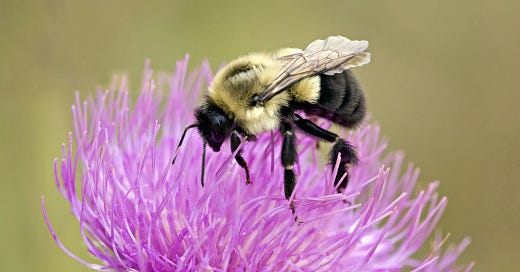Leaving the house the other morning to drive to my former town, an hour away from my current town, I stopped short at a dead bumblebee lying on her back against the gray paving stone of our front walkway. It was a glorious spring day in Virginia, deep blue sky and young, electric green leaves shimmering around us – me, the dead bee, and all the birds I feed, one of whom may well have caught but then dropped the bee.
I try to pay attention to lives at many scales. In our house, I am the person who traps spiders and wasps in cups to take them outside and tries, for as long as my patience holds out, to speak gently to visiting ants. But listen, I also slap mosquitos with gusto because they love to bite me, so I am not claiming any consistent moral high ground here.
On this day I knelt down, picked up a stick, and held it against the bumblebee’s legs. Here was a small jolt of happiness – the bee clasped and clung weakly to the stick. Not over yet. I turned the bee gently right side up so she could rest her fuzzy belly on the stick, and moved her to the shelter of an uncurling fern. Maybe she would recover, or maybe she would continue to die, but perhaps she was marginally safer out of full view on the paving stone.
About 20 minutes later as I sped down the highway, I was arguing in my head with someone close to me who voted for Trump. “How could you vote against the most vulnerable?? Including some in your own family?? Look at us now!!” I raged inwardly. My body felt hot, my chest tight. Please note that I was also listening to the audiobook of The Book of Joy: Lasting Happiness in a Changing World, by the Dalaï Lama and Archbishop Desmond Tutu for perhaps the fourth time.
I am mild-mannered and not prone to anger, but in recent years I have been trying to learn the value of my anger and fierce compassion as tools against ignorance and injustice. The Dalaï Lama and Archbishop Tutu speak to this type of anger in the book, to both the naturalness of anger and our power over what we do with it (and what it does to us). I access my fiercest compassion in writing; in poems and essays and letters to the editor I have successfully wielded sharp swords of compassion. In personal relationships, however, the sword is much harder for me to find and deploy. I’m too nice. I’m uncertain. I freeze. But in my head, I speak fiercely and with conviction – especially on solitary car trips through luminous April days.
At the same moment I yelled “vulnerable??” in my head, I saw, headed straight at my 80mph car, a bumblebee. It veered along a sharp angle and I heard its small body hit the grille on the passenger side with a little thud.
Driving is an act of violence. You can feel this clearly when you get out of your car and stand by the highway for a few minutes. The noise, the smack of wind. The cars, the oil, the roadkill, the crashes, the road rage, the road itself. Yet, the majority of Americans drive every day and car ownership appears only to be increasing. There is no viable movement to eradicate cars, despite the interlocking sets of environmental, social, and cultural problems car culture creates.
In fact, to live in contemporary society is to live in a state of conscious or unconscious moral injury. Where does your food come from? Where does that plastic cup go when you’re done with it? Who made your shirt, and with what materials? Our lifestyles and all the systems that support them have caused and continue to cause deep and lasting harm to the natural world, to other people, and ultimately to ourselves.
We all know this on some level, although many people bury the knowledge as deeply as they can. Others grapple with an enormous sliding scale that slides differently for each person. How aware can we bear to be? How many choices do we make to reduce harm, or not? None of us can live an irreproachable life; most of us are, to a great extent, trapped within harmful systems (as victims, as perpetrators, as both) and trying to make the best decisions we can. But this doesn’t excuse us from pointing out and fighting injustice. We can still hold each other, and ourselves, accountable for making less harmful choices when possible. We can live in a complicated world with awareness and strive for more good, less harm. We can inspire each other.
When the bumblebee hit the car and died, I was startled and dropped the fiery sword of justice I had been inwardly waving around. It was getting in the way. I thought of the morning bee, how I knelt down and used what I could find to help her. How I then sped down the road and killed her cousin. How for every sword I wave at someone in righteous anger, I must also kneel down on hard stone with a soft voice and gentle hands to shift the wounded to a sheltered place, and sometimes – often – both actions will be needed by the same person, and just as often, by me.




oh this. this question. “How aware can we bear to be?”